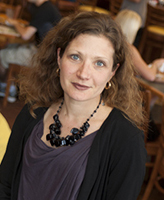
Sociologist Sarah Mustillo ’96 combines real-world experience and statistical expertise to explore the social origins of child mental health issues. This fall she returned to Notre Dame’s College of Arts and Letters to continue her innovative research as a professor in the Department of Sociology.
“Sarah is going to be a tremendous asset to both undergraduate and graduate students, and her research will certainly raise the profile and visibility of our department,” says Professor Rory McVeigh, chair of the Department of Sociology.
“She is one of the top quantitative methodologists in sociology who not only utilizes sophisticated methods, but also creates new and improved ways of analyzing data,” McVeigh adds. “She also has a tremendous record of publishing in top journals with groundbreaking work in medical sociology, social psychology, and other fields. To top it all off, she has an extraordinary record of teaching excellence.”
Social Issues and Statistics
After receiving her bachelor’s degree from Notre Dame, Mustillo worked in the child and adolescent unit at Madison Center in South Bend, Ind. She was struck by common patterns in social conditions of the patients in the hospital and clients in the outpatient clinic.
“It seemed that treating individual disorders was like putting a small Band-Aid on a deep wound and ignoring the fundamental social causes of disorder,” Mustillo says.
Later, while earning her master’s degree and Ph.D. at Duke University, Mustillo says she developed an interest in statistics, which further grew as an assistant professor in the Department of Psychiatry and Behavioral Sciences at Duke’s School of Medicine.
Mustillo now combines her interests in mental illness and statistics on several projects, including identity formation and depression in adolescent girls, and the association between parent and child mental health in post-deployment military families.
In addition, she is co-investigator on a pending National Institutes of Health (NIH) grant that will examine how experiencing major life stressors in childhood impacts health in later adulthood, and on several NIH grants under review that will examine social risk factors of alcohol misuse in adolescence and young adulthood.
Mustillo is currently co-authoring a book on sociological analyses with missing data. She also recently won, with colleagues, the 2013 Kalish Innovative Publication Award from the Gerontological Society of America.
Returning to Roots
Her undergraduate education at Notre Dame was “fundamental in creating and encouraging a sociological curiosity that was also rooted in Catholic social teaching,” says Mustillo.
“The questions I ask are influenced by Catholic social teaching, which calls us to focus our attention on the needs of the most vulnerable, but the answers are found through rigorous scientific research.”
Mustillo, who most recently served as an associate professor at Purdue University, says that Notre Dame’s Department of Sociology has grown and changed since she was a student. “It seems to be an even more exciting place in terms of faculty research excellence and the various centers associated with the department and around campus.
“The chance to return to a university that I hold so near and dear to my heart is the opportunity of a lifetime.”
Award-Winning Teaching
Mustillo will teach a seminar on the social aspects of mental illness and undergraduate statistics, which has already garnered several teaching awards. In fact, she recently completed a one-semester fellowship that supported her work on writing a lab manual for the course.
“I’m thrilled that I’ll get to teach it at Notre Dame. I’m excited to work with such smart and motivated students, and to get involved in the life of the university—from the other side of the desk.”
Mustillo believes students will benefit from her effort to incorporate more statistical simulations into her research. “Doing so made me realize that simulation could also be an effective teaching tool. The lab manual I’ve been working on teaches some of the major lessons through simulation, before appealing to traditional methods and formulas to help students visualize the concepts first.”
And in the process of teaching simulations to undergraduates, Mustillo says she picked up a few new techniques that she was able to incorporate into her own work as well—“a very good example of the reciprocity between teaching and research.”


